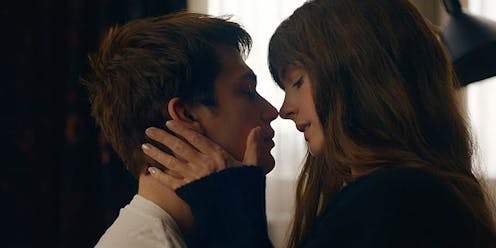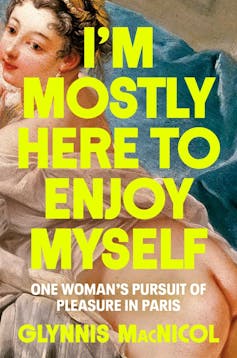
Hollywood’s obsession with age hypogamy — relationships between older women and younger men — never gets old. More than 50 years after The Graduate, a film where Mrs. Robinson, an older woman, propositions a young male college graduate, the Netflix rom-com A Family Affair, starring Nicole Kidman and Zac Efron, has repurposed the same age-gap situationship to drive the plot.

So does the upcoming Bridget Jones flick, Mad About the Boy, in which 50-something Bridget gets involved with a man in his 20s. Let’s not forget Glynnis MacNicol’s memoir I’m Mostly Here to Enjoy Myself, featuring trysts with younger men as part of her pleasure-driven pandemic sojourn in Paris.
A recent Ipsos poll found that many American adults have engaged in age-gap dating — that is, they have previously dated someone with an age difference of 10+ years. It also found that many find such relationships perfectly socially acceptable. And in spite of what the aforementioned films suggest, age-gap relationships occur between not just Boomers or Gen X women and younger men. They also occur between Gen Z men and Millennial women, and are more common than many might think.
The recent movie The Idea of You hit a cultural nerve about age-gap relationships. It features a Millennial woman (Anne Hathaway) getting into a relationship with a younger Gen Z man (Nicholas Galitzine). The film’s subplot of younger mean girls bullying Hathaway’s character dramatizes how harsh society can still be to women who want to enjoy anything other than ring-on-finger “age appropriate” arrangements.
The social reality of Millennial women and Gen Z men dating means we need to rethink stereotypes about MILFs, predatory cougars or boy toys; particularly when it’s the younger men doing the pursuing.
As social scientists who study dating, relating and mate choice, we’re curious about the appeal of these relationships to the people in them. What makes them tick? What should Millennial women and Gen Z men keep in mind when sharing their relationships with family and friends?
No one’s 20s and 30s look the same. You might be saving for a mortgage or just struggling to pay rent. You could be swiping on dating apps or trying to navigate childcare. No matter your current challenges, our Quarter Life series has articles to share in the group chat, or just to remind you that you’re not alone.
Read more from Quarter Life
Ready for the next step in your career? Here’s how to get ready for your first leadership position
Struggling to discuss climate change with older relatives? These 3 scenarios can help
The demographic dance
Our analysis of age hypogamy reveals the pragmatic underpinning of these relationships; it sometimes comes down to who’s available. Many older men often prefer to date younger women. The same is true for a lot of older women, with Millennial and Gen Z men emerging as appealing dating options. For their part, many Gen Z men might have fewer opportunities to date women their own age, or prefer to date older women for various reasons. Enter Millennial women.
Some age gaps gain more attention than others. Age-gap relationships grab people’s attention when they deem the age difference between partners significant. Our reactions also have to do with how old the people in question are. Take the 40 year age difference between Cher (77) and her boyfriend Alexander Edwards (37).
When both partners are relatively young and their age gap smaller, as in the case of some relationships between Millennial women and Gen Z men, it might appear less transgressive or impactful. This could explain why these pairings get relatively little cultural air play. But because these unions occur when a mere few years apart is more meaningful from a developmental standpoint, their significance might be underplayed.
What’s the attraction?
If you’re an older Millennial woman, you might be attracted to younger men for their energy, inclusive views about sex and gender and superior care and literacy about their partner’s emotional well-being. As writer Melissa Mason put it:
He can handle my relationship anxieties. He makes me laugh, and I can be myself around him. It’s just easy.
Millennial women who are with Gen Z men have conveyed to us that they enjoy feeling admired by their boyfriends versus feeling competition from men their own age. One 28-year-old woman said:
He isn’t threatened by any aspects of my life because we are automatically in different places/stages due to the age gap.
Another told us:
Women my age seem to be excited by the freshness and lack of bitterness that comes with dating someone younger. Younger men seem more open and less burdened by insecurities.
What’s in it for the guys?
A 26-year-old man with a nearly 30-year-old partner typified the sentiment of many of his peers. Even his parents, who are of a generation that might dismiss a small age gap as insignificant, “appreciate that she is more mature than people my age.” He added:
I often find women are much more evolved when it comes to relationships and emotional depth and actually expressing feelings. The age difference on top of that means I take a relationship more seriously and grow [more].
In many ways, Gen Z men see Millennial women as an opportunity to “level up” emotionally and socially.
With their evolved attitudes about everything from non-monogamy and gender fluidity to the anti-hustle “soft life,” Gen Z men may be the most likely generation to overturn powerfully entrenched stereotypes about sex and relationships. The kind featured by podcast bros, where unscientific notions like “sexual market value” and oppressive patriarchal norms are peddled to the red pill crew.
Millennial women, for their part, are discovering what Gen X women already know: younger men are not just more available — they’re also more desirable for many reasons. With various generations of partners enjoying what age hypogamy has to offer, this dating strategy may be paving the way to a more equitable and mutually satisfying future for relationships of all kinds.
Launching your age-gap relationship
Although social acceptance of age-gap relationships is increasing, introducing your younger man or older woman to family and friends can still be nerve-wracking. Whether it’s a hard or soft launch, in-person or online, here are some tips to manage the potential push back.
In terms of when to do it, most people share their person with other loved ones when they feel strongly about their partner and relationship. This can reduce the judgmental looks or comments.
It’s important for partners to discuss the emotions that can arise during the meet-and-greet session (e.g. fear, rejection, excitement). Thinking about how to deal with tricky situations in the moment (smile, leave the room, speak your mind, hold your ground) and later on is also a wise game plan (debriefing, journalling).
Millennial women dating younger men might face criticism around having children, or not having them. It might be presumed, for instance, that young men aren’t prepared for fatherhood or that they might talk women out of having kids. Whatever your stance, be firm and confident in what you’ve established with your partner, even if the answer is: “we’re not sure yet.” That’s perfectly OK.
If you’re a Gen Z man dating a Millennial or older woman, you might come up against the idea that age-gap relationships are inherently exploitative. You may also encounter outdated gender-role concerns about your partner being more successful or powerful than you. Facing flack from your friends is something else to consider, especially rude comments about your girlfriend being a “cougar” or “cradle robber.” Stay true to your convictions and be gentle on yourself during the disclosure process.
Anthropologist and author Wednesday Martin co-authored this article.
Treena Orchard has received funding from CIHR, SSHRC, and Western University in the past. However, no funding was received or used in the writing of this article.
This article was originally published on The Conversation. Read the original article.







